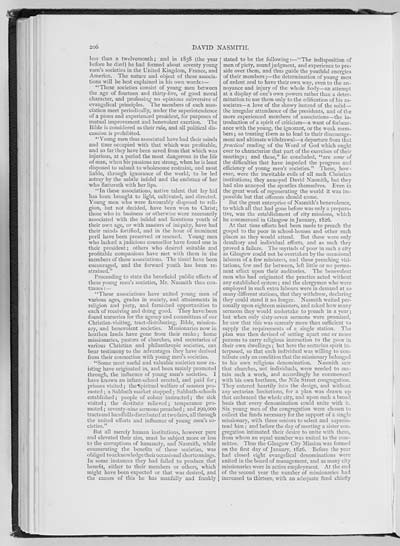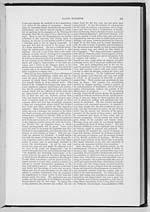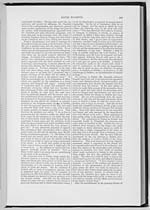206
less than a twelvemonth; and in 1838 (the year
before he died) he had formed about seventy young
men's societies in the United Kingdom, France, and
America. The nature and object of these associa-
tions will be best explained in his own words:�
"These societies consist of young men between
the age of fourteen and thirty-five, of good moral
character, and professing no opinions subversive of
evangelical principles. The members of each asso-
ciation meet periodically, under the superintendence
of a pious and experienced president, for purposes of
mutual improvement and benevolent exertion. The
Bible is considered as their rule, and all political dis-
cussion is prohibited.
"Young men thus associated have had their minds
and time occupied with that which was profitable,
and so far they have been saved from that which was
injurious, at a period the most dangerous in the life
of man, when his passions are strong, when he is least
disposed to submit to wholesome restraint, and most
liable, through ignorance of the world, to be led
astray by the subtle infidel and the embrace of her
who flattereth with her lips.
"In these associations, native talent that lay hid
has been brought to light, cultivated, and directed.
Young men who were favourably disposed to reli-
gion, but not decided, have been won to Christ;
those who in business or otherwise were necessarily
associated with the infidel and licentious youth of
their own age, or with masters of iniquity, have had
their minds fortified, and in the hour of imminent
peril have been preserved or rescued. Young men
who lacked a judicious counsellor have found one in
their president; others who desired suitable and
profitable companions have met with them in the
members of these associations. The timid have been
encouraged, and the forward youth has been re-
strained."
Proceeding to state the beneficial public effects of
these young men's societies, Mr. Nasmith thus con-
tinues:�
"These associations have united young men of
various ages, grades in society, and attainments in
religion and piety, and furnished opportunities to
each of receiving and doing good. They have been
found nurseries for the agency and committees of our
Christian-visiting, tract-distributing, Bible, mission-
ary, and benevolent societies. Missionaries now in
heathen lands have gone from their ranks; home
missionaries, pastors of churches, and secretaries of
various Christian and philanthropic societies, can
bear testimony to the advantages they have derived
from their connection with young men's societies.
"Some most useful and valuable societies now ex-
isting have originated in, and been mainly promoted
through, the influence of young men's societies. I
have known an infant-school erected, and paid for;
prisons visited; the spiritual welfare of seamen pro-
moted ; a Sabbath market stopped; Sabbath-schools
established; people of colour instructed; the sick
visited; the destitute relieved; temperance pro-
moted; seventy-nine sermons preached; and 290,000
tracts and handbills distributed at two fairs, all through
the united efforts and influence of young men's so-
cieties."
But all merely human institutions, however pure
and elevated their aim, must be subject more or less
to the corruptions of humanity, and Nasmith, while
enumerating the benefits of these societies, was
obliged to acknowledge their occasional shortcomings.
In some instances they had failed to produce that
benefit, either to their members or others, which
might have been expected or that was desired, and
the causes of this he has manfully and frankly
stated to be the following:�"The indisposition of
men of piety, sound judgment, and experience to pre-
side over them, and thus guide the youthful energies
of their members;�the determination of young men
of ardent zeal to have their own way, even to the an-
noyance and injury of the whole body�an attempt
at a display of one's own powers rather than a deter-
mination to use them only to the edification of his as-
sociates�a love of the showy instead of the solid�
the irregular attendance of the presidents, and of the
more experienced members of associations�the in-
troduction of a spirit of criticism�a want of forbear-
ance with the young, the ignorant, or the weak mem-
bers ; so treating them as to lead to their discourage-
ment and ultimate withdrawal�a departure from that
practical reading of the Word of God which ought
ever to characterize that part of the exercises of their
meetings; and these," he concluded, "are some of
the difficulties that have impeded the progress and
efficiency of young men's societies." These, how-
ever, were the inevitable evils of all such Christian
institutions; they annoyed David Nasmith, but they
had also annoyed the apostles themselves. Even in
the great work of regenerating the world it was im-
possible but that offences should come.
But the great enterprise of Nasmith's benevolence,
to which all that had gone before was only a prepara-
tive, was the establishment of city missions, which
he commenced in Glasgow in January, 1826.
At that time efforts had been made to preach the
gospel to the poor in school-houses and other such
places as they would attend. But these were only
desultory and individual efforts, and as such they
proved a failure. The myriads of poor in such a city
as Glasgow could not be overtaken by the occasional
labours of a few ministers, and these preaching visi-
tations, few and far between, left little or no perma-
nent effect upon their auditories. The benevolent
men who had originated the practice acted without
any established system; and the clergymen who were
employed in such extra labours were in demand at so
many different stations, that they withdrew, declaring
they could stand it no longer. Nasmith waited per-
sonally upon eighteen ministers, and asked how many
sermons they would undertake to preach in a year;
but when only sixty-seven sermons were promised,
he saw that this was scarcely more than sufficient to
supply the requirements of a single station. The
plan was then devised of setting apart one or more
persons to carry religious instruction to the poor in
their own dwellings; but here the sectarian spirit in-
terposed, so that each individual was willing to con-
tribute only on condition that the missionary belonged
to his own religious denomination. Nasmith saw
that churches, not individuals, were needed to sus-
tain such a work, and accordingly he commenced
with his own brethren, the Nile Street congregation.
They entered heartily into the design, and without
any sectarian limitations, for a plan was drawn up
that embraced the whole city, and upon such a broad
basis that every denomination could unite with it.
Six young men of the congregation were chosen to
collect the funds necessary for the support of a single
missionary, with three seniors to select and superin-
tend him; and before the day of meeting a sister con-
gregation intimated their desire to unite with them,
from whom an equal number was united to the com-
mittee. Thus the Glasgow City Mission was formed
on the first day of January, 1826. Before the year
had closed eight evangelical denominations were
united in the board of management, and as many city
missionaries were in active employment. At the end
of the second year the number of missionaries had
increased to thirteen, with an adequate fund chiefly

![]() Universal Viewer |
Universal Viewer | ![]() Mirador |
Large image | Transcription
Mirador |
Large image | Transcription
![]()

